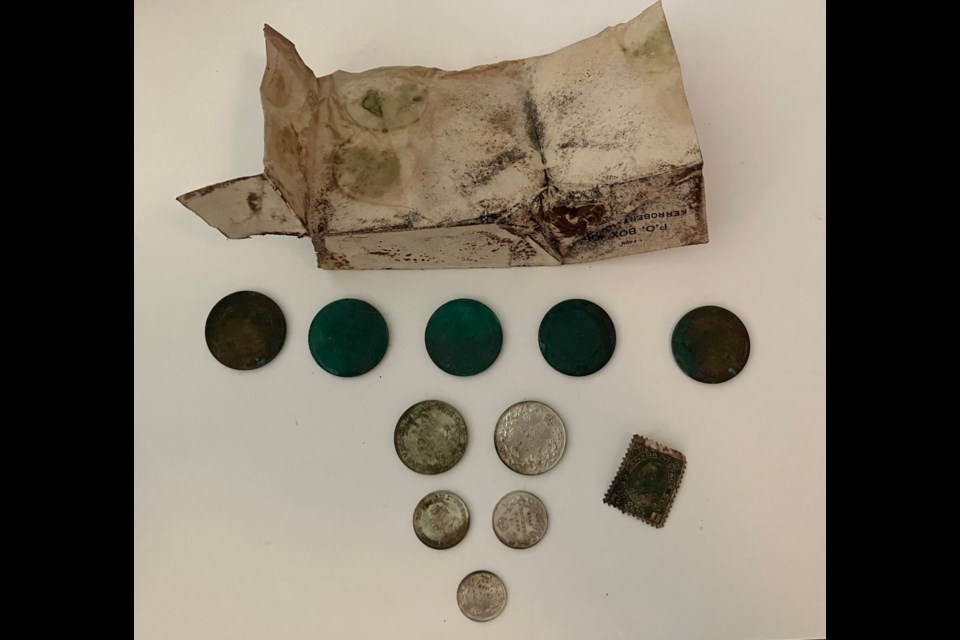KERROBERT — The excitement continued at the Kerrobert courthouse, as the time capsule contents were fully unveiled.
Since the June 23 opening of the time capsule discovered at Kerrobert Courthouse, professional conservators were contacted and have informed the Kerrobert Courthouse Restoration Society how to proceed with the artifacts. On June 29, Veronica Smith and I were able to begin the process of unfolding and taking apart each of the individual papers, and the results were even better than we could have imagined.
Unfolding each piece of paper took an entire day’s worth of work. We began with the program from the Kerrobert Bar Association’s banquet. The inside revealed a legible description of the program, including the songs played as well as some of those who were attending.
Next was the piece of paper that hadn’t been identified yet. We carefully rolled back each fold to reveal a list of judges, barristers, and court officials in the Kerrobert area in 1920. Included was my great-great grandmother’s name, Christy McCulloch, who was a deputy registrar.
After this, we moved on to the stack of newspapers, a daunting task judging by the size of it. We first removed the top booklet to find an envelope of coins sitting underneath. The envelope revealed five pennies, two quarters, two dimes and a five-cent coin which was even smaller than the dime. Our Google search showed us that in Canada, the five-cent coin was made from nickel starting in 1922. After the coins, we were able to peel back the stamp, which was stuck to the newspaper, revealing a depiction of King George V on the green background of the one-cent stamp.
Following this, we began work on the booklets which were laid on top of the newspapers. One of the booklets was a prize list from the Luseland Agricultural Society’s ninth annual exhibition. What appeared to be a “Chautauqua” program was stuck to the top of the other booklet. This made the paper fragile, and we decided not to continue attempting to separate them. From the back of the booklet, we were able to see that it was another prize list, this time from Kerrobert’s Agricultural Society. Inside each of the prize list booklets were various advertisements for each of the town’s businesses, as well as the cash prizes for the winners of each event.
After these booklets, we made our way to the newspapers. The top newspaper was a Kerrobert Citizen issue from July 8, 1920, filled with many interesting stories from the area. We did not have time to unfold the other two newspapers, although they appeared to be the Saskatoon Star and the Regina Leader.
Finally, we started working on the Wilson & Wilson envelope. We began by peeling back the small piece of paper that was attached to the front of it. It is believed that this paper once held a list of town officials, however, most of the handwriting was completely illegible. As we were working on opening the envelope, we received news from the StarPhoenix that an article about the laying of the cornerstone had been found in their archives from 1920. The article explained the event itself, as well as a list of what was put into the time capsule. Everything on the list could be accounted for in the box, however the Wilson & Wilson envelope was not listed at all, indicating that it was placed in at last minute, likely that day.
Inside this envelope we found a handwritten letter detailing events during the building of the courthouse, such as the date the sod was broken and the day the first brick was laid. We also found a blank cheque from the Union Bank of Canada, a faint picture of what appears to be the frame of the courthouse as it was being built, and a fragment of a piece of paper from Wilson & Wilson, although we have not been able to locate the matching piece which would fit with this fragment.
The outcome of our day was incredible. The time capsule has generated excitement in our community, around our province, and beyond. We have already had a significant increase in tourists and locals stopping by to see the message from our past. Even if none of the artifacts would have survived the 102-year wait, the laying of this time capsule would have still sent a message. It tells us that they were hoping and planning for our future, just as we should be today.
I hope that this event has inspired others to take pride in their community and to continue the hard work of those who came before us.




